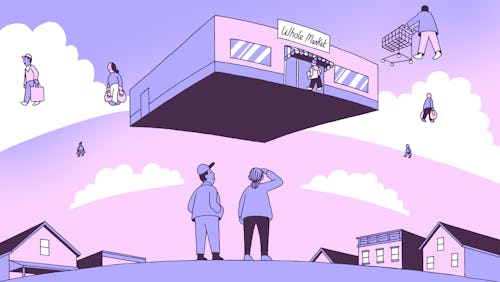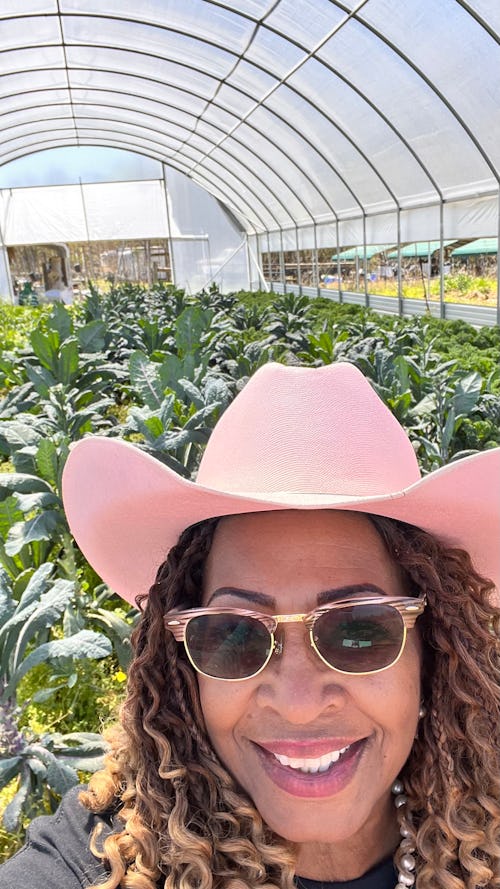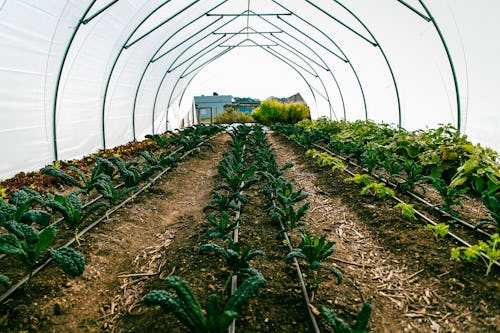
Our Streets is a column by writer and reporter Ray Levy Uyeda that highlights activists, artists, and organizers who are doing the work and reclaiming power for the people.
Dr. Cindy Ayers Elliott wasn’t always going to be a farmer. Up until the early 2000s, she was working a successful career in finance in New York. But after 9/11, Ayers Elliott decided to return to her roots and move in a new direction. So she relocated to her home state of Mississippi, settling in Jackson and hoping to do work that was centered around community. She eventually got a gig as the executive director of an agricultural non-profit organization.
For Ayers Elliott, it wasn’t enough to be talking about food access and farming. She wanted to be actively involved in creating solutions to hunger. And in West Jackson, a historically disadvantaged city within a historically disadvantaged state, hunger and other issues of food discrimination abounded.
So in 2010, Ayers Elliott became a farmer to fill the gaps of food access found in what are known in the policy world as “food deserts.” Essentially, a food desert is a region where residents lack easy access to healthy and fresh food; the United States Department of Agriculture says that a food desert is defined by the distance to the “nearest healthy-food retailer.” Generally, communities and regions suffering from higher levels of poverty are more likely to be categorized as food deserts, as are regions whose populations are majority BIPOC.
But there’s an irony in the existence of food deserts, and the more pervasive experience of food insecurity (or not having enough food), which is that there’s quite enough food to feed everyone in the U.S. And until large-scale policy changes are made to eliminate the two conditions that underlie food deserts (low wealth and little access to stores), local organizers and small-scale farmers are building the solutions to hunger and lack of healthy food.

So, in 1994, Ayers Elliott purchased 68 acres of land in Jackson — a city in which for every 10,000 residents there’s only one grocery store. She intended the land to be a community space where she could live and enjoy in retirement. But when her life’s purpose shifted, so too did the land’s, which later became Foot Print Farms. “I really saw the need to bring a healthier product to the community,” Ayers Elliott tells Mic. “I'm very happy to see that this movement is really catching on.”
Now, the 68 acres comprises the largest urban farm within the city’s limits. Produce from the farm goes to community-supported agriculture, or CSA, which enables low-earning people to pay a flat fee to receive a weekly box of fresh and locally grown produce like kale, mustard greens, bok choy and honey, which they otherwise might not have access to. The farm location is considered a farmer’s market, which means that people can use their Supplemental Nutrition Assistance Program benefits to buy fresh food; there’s also a mobile market, set up at different community centers, neighborhood associations, and churches in order to make buying healthy food easy. In west Jackson, where the nearest grocery store is 15 miles away, to be able to receive 7 pounds of produce for $15 through the CSA (or 15 pounds for $30) is a crucial lifeline.
“Foot Print Farms was established in order to open doors for access — access to information, technical assistance, access to understanding the plight of agriculture and bringing in the professionals to tell us how to do it,” Ayers Elliott says.
Ayers Elliott says her work is not just about providing good, healthy food, but also about building a model of agriculture that can sustain communities, help other small growers launch their farm operations, and demonstrate that Black farmers are succeeding despite the hurdles that have been put in their paths.
“[The term] ‘food desert’ makes a presumption in the composition of the phrase that it’s naturally occurring.”
Indeed, it’s been decades of intentional policy decisions and urban planning choices that have created these obstacles to food access. “What is most current and representative for me is to use the phrase ‘food apartheid,’” says Jocelyn Jackson, one of the creators of People’s Kitchen Collective, an organization based in Oakland, California, that builds community through food. “[The term] ‘food desert’ makes a presumption in the composition of the phrase that it’s naturally occurring.”
Some scholars have connected food deserts to the legacy of slavery. Though slavery was outlawed in 1863, sharecropping was widely practiced from the 1870s through the 1940s. The practice arose as a way for newly freed Black people to have access to farmland, but required them to rent land from another (often white) farmer in a kind of tenant farming system. The arrangements created an exploitative power dynamic between the landowners and farm workers and prohibited the new farmers from building wealth of their own. As sharecropping declined, the federal government established legal forms of housing discrimination known as redlining, and individual states ramped up segregation through Jim Crow legislation.
The result of all these policies was it was nearly impossible for a Black family to build wealth. And amid a rise in KKK lynchings and violence, thousands of Black families moved away from rural areas into large cities during a period known as the Great Migration.
“These are all intentional practices that created these circumstances. It’s not a passive undertaking, and for me that’s violent … it’s genocidal.” Jackson says. “The fact that it happens slowly and over decades and over generations doesn’t make it any less violent.”
Jackson was one of the more popular Great Migration destinations. But it was also a heavily segregated city, so Black entrepreneurs, artists, and culinarians created a bustling section of the city that was known for decades as the “Black Mecca” of Mississippi. But years of promises unfulfilled by federal desegregation policies left the area blighted. It’s this same legacy Ayers Elliott has been trying to combat — and which Salam Rida, one of the creators of a mixed-use incubator space known as Ecoshed, is hoping to change too.

Ecoshed, which opened in May 2021, is located in an industrial neighborhood in central Jackson and hosts a salon, kitchen, offices, and a quarter-acre farm called Fertile Ground Farm. Some of the farm’s produce gets sold at a nearby farmer’s market, and other produce is used by small food business owners to get their businesses off the ground in the Ecoshed incubator kitchen; Ms. T’s Sweets And Treats, which sells jellies and other baked goods, utilizes strawberries grown on the Ecoshed farm.
For Rida, the small farm and the products made in Ecoshed’s kitchen aren’t just an answer to food insecurity. They also demonstrate the importance of growing and selling food locally. For starters, it allows the dollars to stay in the community. But it’s also better for the environment. Food grown at Ecoshed’s farm and cooked in Ecoshed’s kitchens doesn’t have to travel thousands of miles on trucks, releasing tons of carbon dioxide into the air, to reach Ecoshed’s community. Food grown at small scales is healthier for people and communities — especially given that Black communities disproportionately suffer from the environmental racism brought about by factory farming.
For Rida, “it’s also about education and being able to close the gap between [questions of] where’s our food coming from and how are we receiving it and who’s growing it?”
A hyper-local economy isn’t a new solution to food insecurity — it’s just one that got pushed to the side as industrial farms and big grocery store chains started taking hold of the U.S. It also happens to be that those are the systems that helped to create food insecurity and food deserts. Changing our food system “would also require people to kind of change the way that they think about consumption and convenience,” Rida says.
Put more simply, she says: “We really need to rethink how we’re growing food.”







